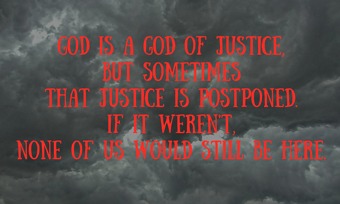CHRISTIAN LIFE & GROWTH
On Grudges, Retaliation, and Justice Postponed
By Beth Hyduke

When we face injustice and wrongs in our interpersonal relationships, we are to actively practice forgiveness towards those who have wronged us (Matthew 6:12; 18:33; Ephesians 4:32), but that does not mean that those who wrong us get away with anything, or that you will not be vindicated. "'Vengeance is Mine,' says the Lord, 'I will repay'" (Romans 12:19). This is not a passive aggressive way of getting even with our enemies, it is a way to return the prerogative of vengeance to the one to whom it belongs, to let go of our personal grievances and move forward in love, unburdened by that which held us back from loving others freely and unconditionally. Ultimately, God can make this promise and can claim sovereign right to all vengeance because God is the primary Being against whom all sin is directed.
The concern about injustice to ourselves stems from either a desire in us to wield God's authority and prerogative to avenge, or a lack of trust in Him to be who He says He is and to do what He promises to do. When we want to be the ones who serve justice to those who have wronged us, a taint of spite, selfishness, and vindictiveness accompanies the desire because we are sinful human beings who are incapable of serving unbiased, even-handed impartial retribution for personal offenses. God, on the other hand, is the perfectly holy, perfectly just, righteous Judge (Genesis 18:25, Deuteronomy 32:4, Psalm 7:11), and because all sin is an attack on Him, the right, the authority, the prerogative, the power, and the ability to justly avenge it belongs to Him, not to us.
So too, does the timing. Before I came to Christ, I was deeply offended by injustice and disturbed with how prevalent it was from the global all the way down to the interpersonal level — it was one of the things that held me back intellectually from committing to Christ. I struggled to accept that a just, merciful, all-powerful God would tolerate and seemingly overlook so much injustice, suffering, and evil in His world. After I came to Christ, though still troubled by injustice (especially when I'm on the receiving end of it), I am much less perplexed by it. Before Christ, I had seen it as problematic evidence against God's existence, sovereignty, or goodness; after Christ, I came to realize that injustice is a temporary condition, a consequence of manmade sin — but that God allows it for a time is evidence of God's loving patience and forbearing grace to a world full of sinners.
God may wait longer than we think He should to serve someone their just desserts, but His retribution, like His salvation, is always divinely timed. If His vengeance is postponed or transferred onto Christ it is done in order to bring about His glory and our good. There is a purpose to God's patience, and 2 Peter 3:9-10 tells us what that purpose is: "The Lord is not slow to fulfill His promise as some count slowness, but is patient toward you, not wishing that any should perish, but that all should reach repentance." Thank God that His justice is often compassionately postponed, because in a world where there was immediate, divine retribution for wrongs that have been committed, there would be no second chances or time to repent and believe and get right with God — not for those who had done us wrong and not for us who have done others wrong. There wouldn't be anyone left in such a world (certainly not me) because, apart from Christ, all of us are sinners who have earned and fully deserve God's wrath (Ephesians 2:3).
Image Credit: Jan-Mallander; untitled; Creative Commons
Tags: Biblical-Truth | Christian-Life | God-Father | Hardships | Sin-Evil
comments powered by Disqus
Published on 7-11-16

